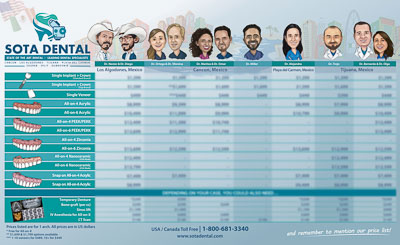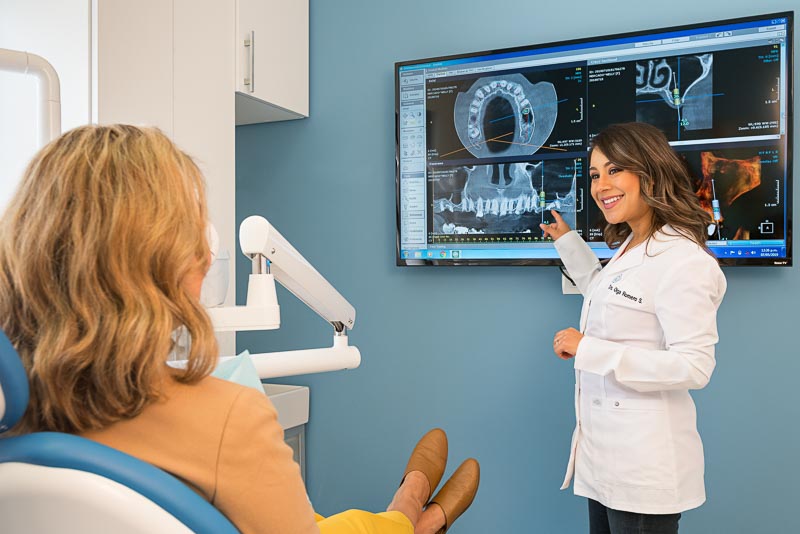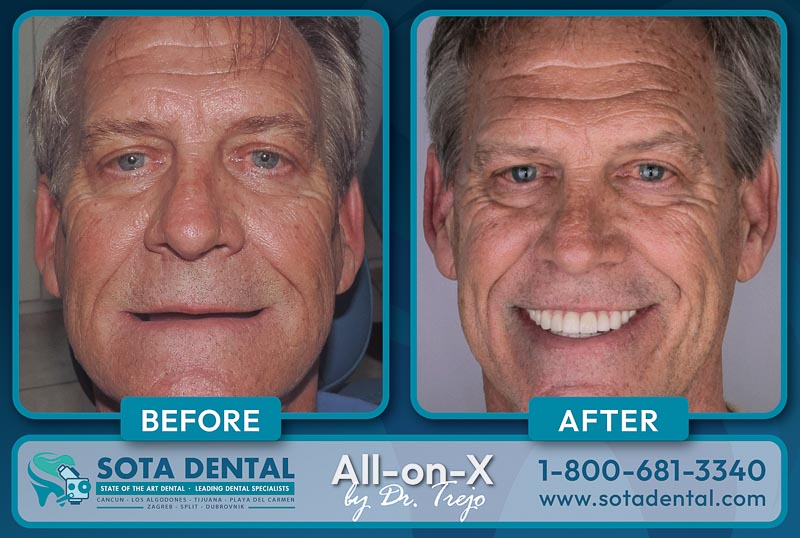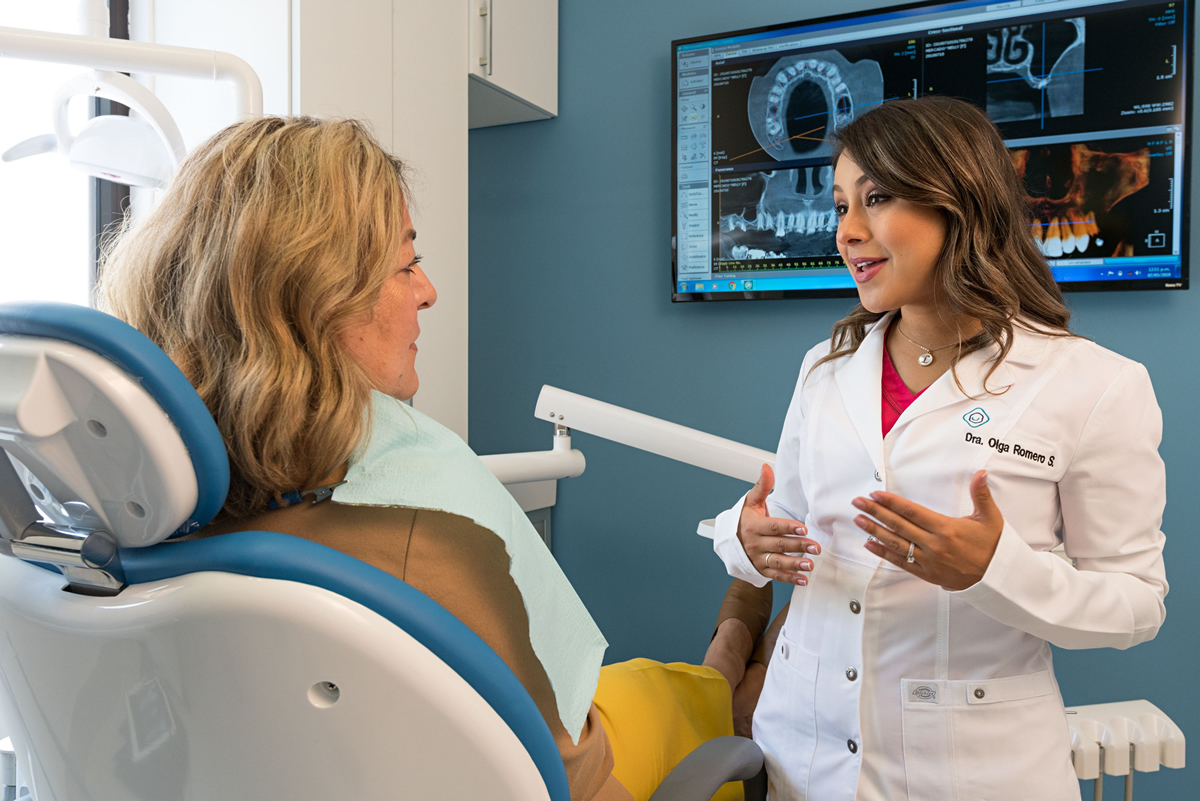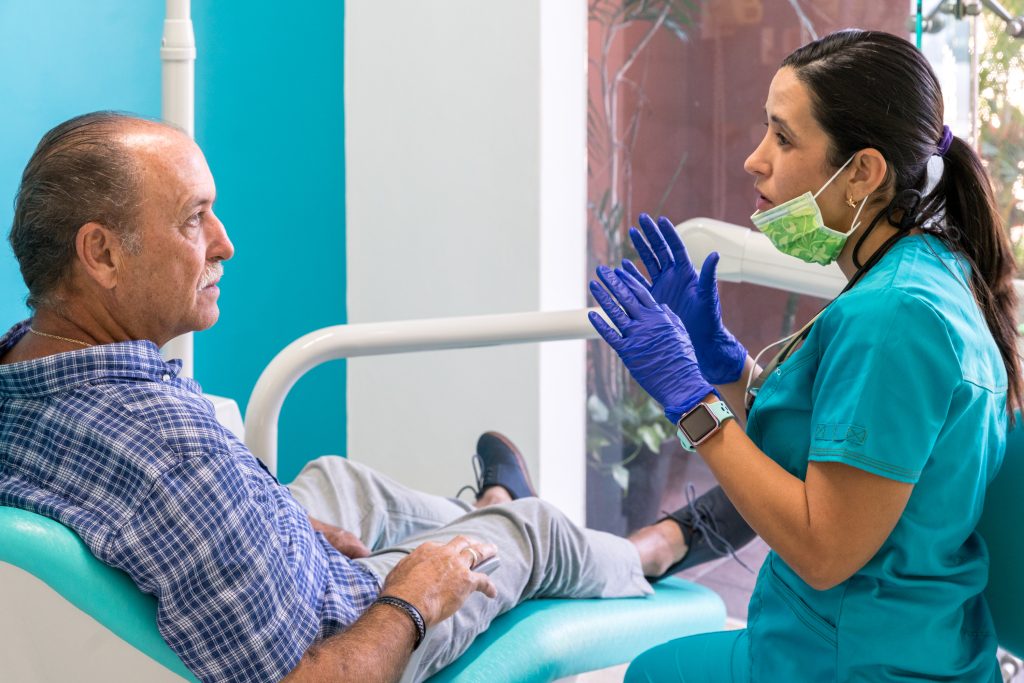 An all-on-4 is a surgical procedure to fully rehabilitate a full dental arch. This is commonly done with 4 implants only, thus its name. It’s important to keep both of your arches working properly for proper oral health. The all-on-4 prosthesis looks and functions similar to real teeth and can be just as aesthetic with the right care. This is why it is necessary to build good dental habits. It’s important to take care of your all-on-4 prosthesis because no matter where it is purchased, it’s not cheap!
An all-on-4 is a surgical procedure to fully rehabilitate a full dental arch. This is commonly done with 4 implants only, thus its name. It’s important to keep both of your arches working properly for proper oral health. The all-on-4 prosthesis looks and functions similar to real teeth and can be just as aesthetic with the right care. This is why it is necessary to build good dental habits. It’s important to take care of your all-on-4 prosthesis because no matter where it is purchased, it’s not cheap!
At SOTA Dental, we specialize in the all-on-4 procedure. With the highest medical standards, state-of-the-art technology, and hearts full of passion, our professionals assure a successful procedure. In Mexico, prices are also more competitive than in the USA & Canada which means we do a lot.
In this article, we’ll explain how to take care of an all-on-4.
What should you do to take care of an all-on-4 immediately after surgery?
The information for this section is very similar to the information in our article: How to take care of dental implants? The patient must take care of an all-on-4 the same way they would a single implant.
We recommend patients to:
- During the first hour after surgery, bite on gauze or sponges to stop any bleeding.
- During the first half-day, keep your mouth closed as much as possible. You can also maintain your head elevated to help direct blood pressure.
- If you are swollen, place a pack of ice on your cheek and hold it in place for 15 minutes every time you need it.
- In the first 24 hours, eat only soft foods and avoid rinsing or brushing your teeth.
- For the first 72 hours, you might experience bleeding and swelling. Take the prescribed medications to avoid pain and future problems.
- Your gums will heal significantly in about 10 to 15 days. Take the utmost care of your mouth during this time. Brush your gums gently and avoid contact with the recovering area.
- The osseointegration between the implant and the bone can take anywhere between 3 to 6 months. During this time, keep excellent cleaning habits and avoid tough foods.
a
Can I drink alcohol or smoke tobacco after an all-on-4 procedure?
Smoking and drinking alcohol severely interfere with the healing process, especially in the beginning stages. It is highly recommended to avoid smoking during the osseointegration process. Not following this advice could lead to your body rejecting the implant and having to start the process all over again. This is one of the most important factors when considering how to take care of an all-on-4.
Smoking is not only bad for oral health but can also stain a prosthesis. For this reason, we recommend that patients consider quitting before they start their procedure, to make the healing process easier. The rehabilitation process of the all-0n-4 can be stressful and really make a patient want to smoke if they already still normally do. The sooner a patient quits, the easier and safer this process will be.
You must take care of an all-on-4 for it to truly be a successful procedure. It is always best to follow your dentist’s recommendations regarding dental care.
Risks and complications of an All-on-4
Any surgery comes with risks and rewards, but thanks to modern science, all-0n-4 surgeries have become much more predictable. It’s important that patients follow all the instructions and recommendations from the dentist to avoid complications after the procedure. It is normal to experience some pain, however, if you notice any of the following symptoms, visit your dentist immediately:
- Extreme pain, even with medication
- Bleeding after the first 48 hours
- Increasing bruising gums or skin after 48 hours
- Abnormal swelling on face and gums
- Puss
- Wound-healing issues
…
If you feel some of these symptoms, don’t panic. These issues do not mean serious problems but are rather indicators to contact your dentist. If the patient follows all the recommendations, there should be no problem.
We encourage our doctors and patients to always continue to have regular communication. This is vital in the entire procedure and will assure the best results, with fewer risks and complications.
If you want to go deeper into the all-on-4 procedure, we recommend you watch the video below:
What habits are needed to take care of an All-on-4?
Having a clean mouth is very important. Dental problems and many other health issues develop from poor oral hygiene. Therefore, it is important to take great care of your dental health, especially after getting an all-on-4.
Not taking care of your all-on-4, or teeth in general, lead to bacterial growth. This can have a destructive impact on your dental implants and cause all sorts of issues with your gums. It could also cause bad breath, a strange taste in your mouth, and even a fever. For that reason, make sure to follow these guidelines for oral health:
1. Brush your All-on-4 prosthesis
 It’s important to brush your teeth regularly, at least twice per day. This goes the same in order to take care of an all-on-4. Brush before you go to sleep at night and after each meal if possible. Use a toothbrush with soft bristles if you have sensitive gums. Brush your prosthesis thoroughly with gentle circular movements.
It’s important to brush your teeth regularly, at least twice per day. This goes the same in order to take care of an all-on-4. Brush before you go to sleep at night and after each meal if possible. Use a toothbrush with soft bristles if you have sensitive gums. Brush your prosthesis thoroughly with gentle circular movements.
Using an electric toothbrush is more effective at removing odors and bacteria. Replace your toothbrush once it’s bristles have lost their original strength and form.
2. Floss between crowns for Peek & individual crown All-on-4 prostheses
Some prostheses are made of one solid piece while others are made with individual crowns. If you have a prosthesis with individual crowns over a substructure, you need to floss to take care of your all-on-4. Even though flossing usually means cleaning in between your teeth with dental floss, you can also floss your prosthesis for better oral health. There are various kinds of floss you can use, however, we recommend using super flosses. Super floss has three components: a firm end to floss under bridges or dentures, a sponge-like middle part to cover more space, and a regular floss to eliminate plaque.
Floss at least once a day, however, the best results come from flossing after every meal. This will help to remove any remaining food stuck in your denture and crowns.
3. Rinse your All-on-4 prosthesis
Rinse your mouth with a high-quality mouthwash. Choose the proper rinse for your denture and don’t be afraid to ask your dentist for a recommendation. A good rule of thumb is to use the rinse with the least amount of hydrogen peroxide. Avoid higher levels of that substance because it can be harmful. Small amounts are fine.
Always follow your dentist’s recommendations for toothpaste, mouthwash, and dental floss. It is also helpful to change your oral cleaning products to non-abrasive ones. Avoid intense flavor products, such as cinnamon or strong mint if you feel an unpleasant sensation in your mouth.
If the mouthwash is too strong, mix ¾ of water with ¼ of a mouth rinse to remove food debris after every meal.
4. Avoid smoking and drinking alcohol
 Drinking alcohol and smoking have a negative impact on your dental health. Cigarettes contain chemicals that stain and harm your teeth. Alcoholic drinks are often sugary and have high acidity, therefore they are the perfect combination for bacteria to grow in your mouth.
Drinking alcohol and smoking have a negative impact on your dental health. Cigarettes contain chemicals that stain and harm your teeth. Alcoholic drinks are often sugary and have high acidity, therefore they are the perfect combination for bacteria to grow in your mouth.
Having a dry mouth due to alcohol can also increase the risk of developing cavities. When you don’t produce enough saliva (dry mouth), there is no way for your mouth to wash away invading microorganisms. That, combined with the sugar in most alcoholic drinks, provides the best environment for bacterial growth and plaque build-up.
Smoking also weakens your immune system, which makes it harder for your body to fight infections, including gum infections. It also makes it harder for your mouth to heal. The more you smoke, the greater the risk of suffering from gingivitis.
It is recommended to limit your alcohol intake and try to smoke as little as possible.
Visit your dentist for regular check-ups
Visit your dentist for a professional cleaning once every 3 to 6 months. Your dentist is the one who really knows how to take care of an all-on-4 and make sure it lasts as long as possible. During your visit, your dentist will also look for dental conditions and treat them right on the spot. Your dentist knows your case better than anyone and will guide you through the entire process.
Maintaining an honest relationship with your dentist is crucial. Following his recommendations will lead to a beautiful smile for a lifetime. To delve deeper into the care of your all-on-4 prosthesis, explore resources like the Journal of Dental Education, which offers comprehensive insights into dental procedures and maintenance.
Diet with an All-on-4
 Having a balanced diet in our lives is always a good idea, however, it is necessary to keep a healthy all-on-4 and good oral health. In this section, we are going to share with you a list of foods that are healthy for your denture as well as food that you should avoid eating.
Having a balanced diet in our lives is always a good idea, however, it is necessary to keep a healthy all-on-4 and good oral health. In this section, we are going to share with you a list of foods that are healthy for your denture as well as food that you should avoid eating.
You can safely eat the following foods:
- Vegetables: steamed carrots (or chopped into little pieces), broccoli, beans, peas, potatoes, pumpkin, and sweet potatoes.
- Fruits: Raspberries, avocado, bananas, blueberries. Harder fruits like pears, apples, and peaches need to be peeled and cut into little pieces
- Dairy: Custard, smoothies, yogurt, cottage cheese, and milky rice pudding.
- Grains and starches: Soft noodles and pasta, lentils, and oats.
- Meats: Chicken, beef, slow-cooked lamb, and ground mince. Be careful to cut into small pieces if the meat is chewy.
- Fish: Steamed fish and tuna.
- Other: Soft tofu and another soy-based meat substitute. Applesauce, smoothies, protein shakes, boiled or scrambled eggs, soups and stews.
…
To properly take care of your All-on-4, you must use caution with these foods
The following foods are a little bit tricky. You can eat them, but be careful. Some of them might be tough or acidic which could be bad for your all-on-4. When eating tough foods, try to chew them slowly and with your molars. For acidic food, if you brush, floss, and rinse your teeth after every meal, there should be no problem.
- Vegetables: Raw carrots, asparagus, raw broccoli, celery. Crispy and deep-fried vegetables
- Fruits: Oranges, lemons, apples, and pears.
- Dairy: Cheeses that are hard or ones containing nuts.
- Grains and starches: crunchy cereal, muesli bars, popcorn, bread with a lot of grains, chewy bread, crusts of bread, crackers, and biscuits.
- Meats: Battered, crumbed, or crispy coated meats. Fried fish, tough and chewy cuts of meat.
- Spicy foods: Tabasco sauce, tomato sauce, and hot chili. Spicy foods should be avoided if they cause discomfort.
- Fats: Crunchy nut butter, coconut flakes, seeds, and nuts.
- Other: Gum and chewy candies.
- Drinks: Acidic and hot liquids.
How to get an All-on-4 with SOTA Dental?
At SOTA Dental, we specialize in the all-on-4. We perform this procedure more than any other procedure. I’d go as far to say that we perform more all-on-4s than any other team in Mexico and possibly even the United States. Our doctors are some of the most well-known doctors in the world who teach this procedure globally. We are glad to have been able to help so many people by improving their smiles. Of all the things our team has accomplished over the years, giving people their smiles back has been our best achievement. To see some of our finished all-on-4 cases, check our Before & After photo gallery.
Our dental teams are working in 4 different locations in Mexico: Tijuana – Cancun – Los Algodones – Playa del Carmen. We also have 4 teams located in Croatia: Split – Dubrovnik – Zagreb.
Our doctors treat every case as unique and every patient as special.
If you want to take a look at our prices and specials, click here. Read our article “How much do dental implants cost” if you want an explanation of why our prices are cheaper than in countries like the United States, Canada, or the United Kingdom.
To start your treatment, please fill out our Patient Form. By doing this, our doctors will review your case and send you a personalized treatment plan.
We highly recommend you visit our Video Library for an extensive array of useful videos. You can virtually meet our doctors who will explain the procedures, treatments, and timelines for your all-on-4. If you want to get more information about the all-on-4 procedure, please watch the video below:
Taking care of your All-on-4 is up to you!
Taking care of an all-on-4 is simple, it’s just a matter of following the guidelines presented in this article. Eventually, these guidelines will become habits. Just take care of your denture as if they were your real teeth.
Creating healthy habits for your mouth will also improve your daily life. Building good habits takes time and effort, do try to stay focused and create a new you! In the end, it is going to be worth it and you’ll have a beautiful smile that will last you a lifetime.
Making an effort to take proper care of your dental health will always lead to a successful procedure, a healthy smile, and a long-lasting prosthesis. In order to have the bests results, be sure to follow these recommendations and discuss your options with your doctor.
And last but not least, enjoy your new teeth. The all-on-4 procedure was created to recover your oral health and improve your life. Go out and enjoy it!

